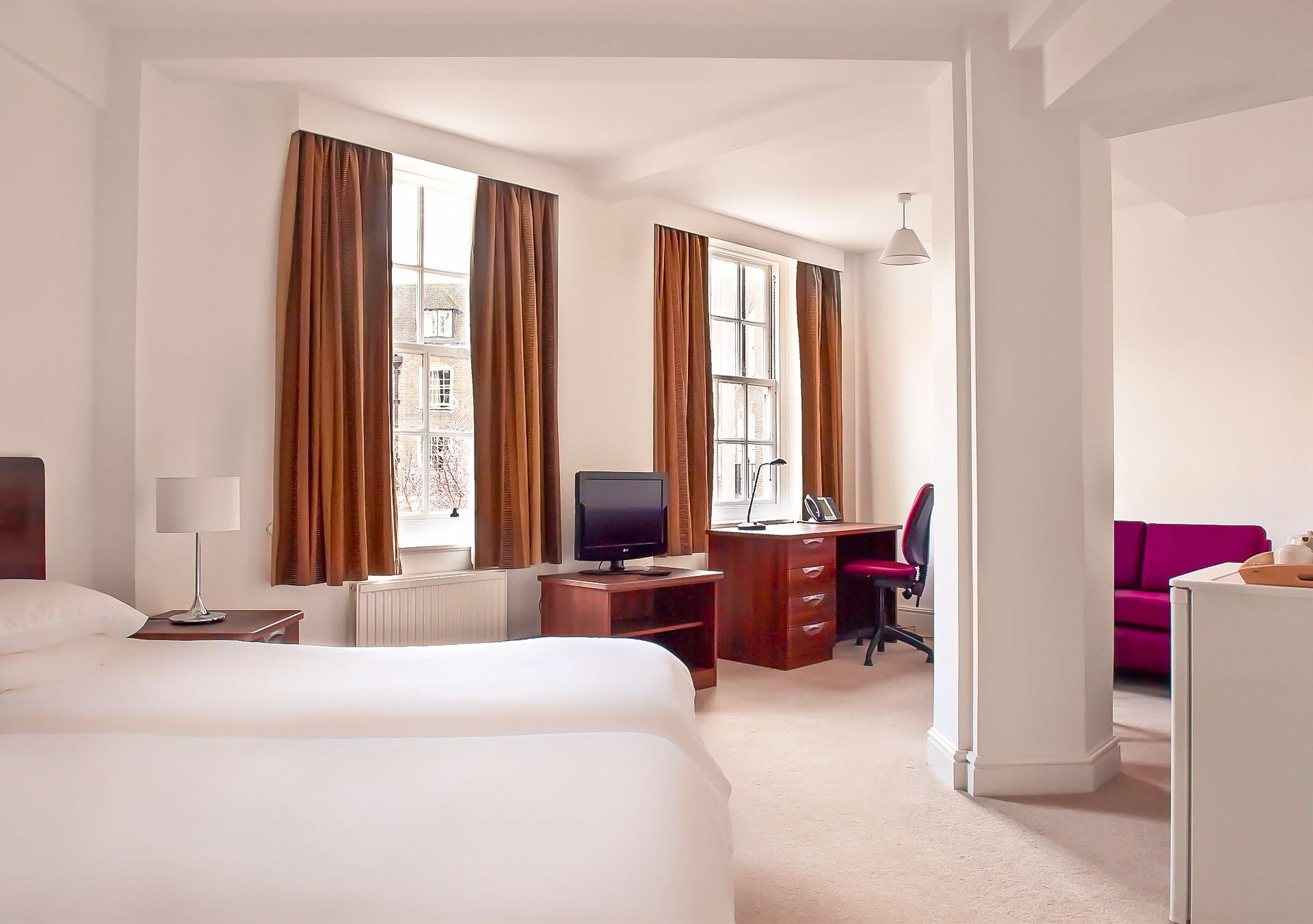Si bien Cambridge posiblemente existió en la época romana y creció hasta convertirse en una ciudad comercial normanda (el nombre de la ciudad mutó de Grentabrige o Cantebrigge (Grantbridge), su Universidad lo convirtió en lo que es hoy.
La Universidad se formó en 1209 cuando un grupo de eruditos de Oxford se mudó a la ciudad para escapar de la violencia que prevalecía en Oxford en ese momento. Pero incluso en estos días la Universidad tenía problemas de disciplina (!). Los estudiantes no pertenecían a ningún organismo en particular, no eran responsables ante ninguna persona y entraban y salían de manera irregular. En 1231, los estudiantes de Cambridge eran suficientes en número y aparentemente tan rebeldes que Enrique III emitió una serie de órdenes judiciales para castigar a los alborotadores.
Fueron las soluciones a estos problemas disciplinarios, ideadas por Hugh de Balsham, obispo de Ely de 1257 a 1286, las que sembraron las semillas del sistema universitario actual. Colocó a los eruditos (ahora conocidos como los "eruditos del obispo de Ely") en dos casas junto a la Iglesia de San Pedro en Trumpington Road. Esto se conoció como "La Casa de San Pedro" y, así, gradualmente, el sistema universitario comenzó a evolucionar y nació Peterhouse, el primer colegio de Cambridge.
En 1318 la Universidad fue bautizada oficialmente con una Bula Papal del Papa Juan XXII. Poco después siguieron otras universidades: Trinity College (originalmente llamada Michaelhouse) fue fundada en 1324 por el Ministro de Hacienda de la época, Hervey de Stanton, y Clare College, originalmente llamada University Hall, fue la siguiente en 1326. Pembroke College se fundó en 1347 por la esposa del conde de Pembroke y al año siguiente, Edward Gonville fundó su propio colegio que llegó a ser conocido como Gonville Hall: este fue luego refundado por el Dr. John Caius en 1557 para darnos Gonville y Caius.
La mayoría de las universidades fueron fundadas por personas adineradas de la Iglesia, el gobierno o terratenientes. Corpus Christi , fundado en 1352, se caracteriza por ser el único colegio que surgió directamente de los miembros de la ciudad. Christopher Marlow, el famoso contemporáneo de Shakespeare, era estudiante en la universidad y todavía se pueden ver sus habitaciones en el antiguo patio.
King's College fundado en el siglo XV: Enrique VI pretendía que formara parte de una fundación doble con Eton y al hacerlo hay alguna evidencia de que estaba repitiendo el plan de Guillermo de Wykeham, que había fundado Winchester y New College, Oxford. Queens fue fundada por Margarita de Anjou, esposa de Enrique VI, y más tarde, la esposa de Guillermo IV, Elizabeth Woodville, se convirtió en cofundadora (por lo tanto, Queens en lugar de Queen). Naturalmente, esto se ha descrito como el primer símbolo exterior de la reconciliación de las casas de York y Lancaster.
El siglo XV también trajo otras dos universidades: John Alcock, el entonces obispo de Ely, fundó Jesús en 1469 y Robert Wodelark, rector del Kings College, fundó St Catharine's en 1473.
Ahora con 31 facultades, la Universidad ha crecido gradualmente en tamaño, estatura e influencia en el mundo: sus graduados han alcanzado los niveles más altos en ciencia, la Iglesia, el gobierno y los negocios en todo el mundo.
Algunos alumnos y académicos notables
15 primeros ministros británicos, incluido Robert Walpole, considerado el primer primer ministro de Gran Bretaña.
Oliver Cromwell - Lord Protector de Inglaterra (1653-58) - Sidney Sussex
Sir Isaac Newton - matemático, físico, astrónomo, alquimista, teólogo y autor- Trinity
Charles Darwin - teoría desarrollada de la selección natural - Cristo
Francis Crick, James Watson, Rosalind Franklin y Maurice Wilkins: modelo 3D establecido de ADN
Sir Ian Wilmut - clonó a la oveja Dolly en 1996 - Darwin
Sir David Attenborough - naturalista y locutor - Clare
Stephen Hawking - físico, cosmólogo y autor - Trinity Hall
Rowan Williams - ex arzobispo de Canterbury - Magdalena
Sir Ian McKellan - actor - St Catharine's
Stephen Fry y Hugh Laurie - actores - Queen's y Selwyn
Sandi Toksvig - Personalidad de televisión - Newnham
Dame Jocelyn Bell Burnell - Astrofísica que descubrió los púlsares - Murray Edwards
Mishal Husain - locutor y presentador - Murray Edwards
Tilda Swinton – actriz – Murray Edwards
Zadie Smith - novelista - King's
Carol Vordemon - presentadora - Sidney Sussex
Naomie Harris - actriz - Pembroke College
Arianna Huffington - creadora del Huffington Post - Girton
Baronesa Brenda Hale – Presidenta de la Corte Suprema del Reino Unido – Girton
